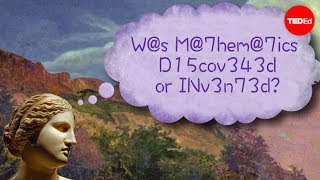(单词翻译:单击)
Would mathematics exist if people didn't?
如果没有人的存在还会有数学吗?
Since ancient times, mankind has hotly debated whether mathematics was discovered or invented.
在古时侯,人类就对数学到底是被发明的或是被发现的激烈地争辩。
Did we create mathematical concepts to help us understand the universe around us,
人们创造数学概念是为了更好得了解周围的世界呢,
or is math the native language of the universe itself, existing whether we find its truths or not?
还是数学本就是宇宙的语言,一直存在于这世界上,不管人类的介入与否?
Are numbers, polygons and equations truly real,
数字,多边形和对等是真的,
or merely ethereal representations of some theoretical ideal?
还是只是些空洞的理论概念?
The independent reality of math has some ancient advocates.
数学的独立存在有很多古代支持者。
The Pythagoreans of 5th Century Greece believed numbers were both living entities and universal principles.
五世纪希腊的毕达哥拉斯相信数字既是存活的实体又是宇宙的规则。
They called the number one, 'the monad,' the generator of all other numbers and source of all creation.
他们把数字1叫做“单子”,是所有其它数字的启动器,是所有东西的来源。
Numbers were active agents in nature.
数字是大自然的活性剂。
Plato argued mathematical concepts were concrete and as real as the universe itself, regardless of our knowledge of them.
柏拉图认为数学概念是具体的,数学概念就像宇宙自身一样真实,不管我们是否意识到它们的存在。
Euclid, the father of geometry, believed nature itself was the physical manifestation of mathematical laws.
欧几里德,几何之父,相信自然本身就是数学定律的物理表现。
Others argue that while numbers may or may not exist physically, mathematical statements definitely don't.
而有些人却说因为数字并非一定有实体,数学的命题完全不是真实存在的。
Their truth values are based on rules that humans created.
它们的真实价值是基于人类所创立的规则。
Mathematics is thus an invented logic exercise, with no existence outside mankind's conscious thought,
数学是一种被发明的逻辑练习,在人类的理性的思想之外并不会存在,
a language of abstract relationships based on patterns discerned by brains,
它是一种能被大脑识别的基于某种格式的抽象语言,
built to use those patterns to invent useful but artificial order from chaos.
利用这些模式,在混乱中来发明有用的人为秩序。
One proponent of this sort of idea was Leopold Kronecker, a professor of mathematics in 19th century Germany.
这种理论的支持者是利奥波德·克罗内克,一位十九世纪德国的数学教授。
His belief is summed up in his famous statement: 'God created the natural numbers, all else is the work of man.'
他的信条可在他著名的宣言中总结如下:“上帝创造了自然数,除此之外都是人类的工作。”
During mathematician David Hilbert's lifetime, there was a push to establish mathematics as a logical construct.
在数学家大卫·希尔伯特的一生中,他对将数学看做一种逻辑的建树有很大的推动。
Hilbert attempted to axiomatize all of mathematics, as Euclid had done with geometry.
希尔伯特曾尝试将所有的数学公理化,就像欧几里德在几何上所做的。
He and others who attempted this saw mathematics as a deeply philosophical game but a game nonetheless.
他和其他尝试这件事的数学家把数学看成是一场深奥的哲学游戏,但依旧只是一个游戏。

Henri Poincaré, one of the father's of non-Euclidean geometry, believed that the existence of non-Euclidean geometry,
亨利·庞加莱,是非欧几里德几何之父,他相信非欧几里德几何的存在,
dealing with the non-flat surfaces of hyperbolic and elliptical curvatures,
处理了非平面的双曲线和椭圆曲率,
proved that Euclidean geometry, the long standing geometry of flat surfaces, was not a universal truth,
从而证明欧几里德了的平面几何这一长时间被认同的理论并不是全部的宇宙真相,
but rather one outcome of using one particular set of game rules.
只是遵从了游戏规则的一种的结果。
But in 1960, Nobel Physics laureate Eugene Wigner coined the phrase, 'the unreasonable effectiveness of mathematics,'
但在1960年,诺贝尔物理学奖得主尤金·维格纳创造了“数学不可思议的有效性”这一说法,
pushing strongly for the idea that mathematics is real and discovered by people.
强烈得灌输了数学是真实存在的,并且是由人们发现的。
Wigner pointed out that many purely mathematical theories developed in a vacuum,
维格纳指出很多纯粹的数学理论是在真空里发展出来的,
often with no view towards describing any physical phenomena, have proven decades or even centuries later,
常常无视任何物理现象,这些理论在几十年或几个世纪后被证明,
to be the framework necessary to explain how the universe has been working all along.
它们仅仅是空空的骨架,需要进一步地阐述整个宇宙是如何一直维持运行的。
For instance, the number theory of British mathematician Gottfried Hardy,
比如,英国数学家哥特弗里德·哈迪的数字理论,
who had boasted that none of his work would ever be found useful in describing any phenomena in the real world, helped establish cryptography.
他曾自嘲说,他的工作在描述实用现象上没有一项是有用的,但是他帮助建立了密码学。
Another piece of his purely theoretical work became known as the Hardy-Weinberg law in genetics, and won a Nobel prize.
这是他的另一个纯理论成果,也变成了著名的遗传学上的哈迪-温伯格定律,并且赢得了诺贝尔奖。
And Fibonacci stumbled upon his famous sequence while looking at the growth of an idealized rabbit population.
斐波那契在看一组被理想化的兔子总数时,磕磕绊绊得出了他的著名的数列。
Mankind later found the sequence everywhere in nature,
而人类后来发现自然中到处都存在序列,
from sunflower seeds and flower petal arrangements, to the structure of a pineapple, even the branching of bronchi in the lungs.
从葵花籽到葵花花瓣的排列以及菠萝的结构,甚至肺中的支气管分支。
Or there's the non-Euclidean work of Bernhard Riemann in the 1850s,
还有19世纪50年代的波恩哈德·黎曼的非欧几里得的研究成果,
which Einstein used in the model for general relativity a century later.
爱因斯坦一个世纪之后才在广义相对论的模型中使用到它。
Here's an even bigger jump: mathematical knot theory, first developed around 1771 to describe the geometry of position,
这里甚至有一个更大的跳跃:数学扭结理论,它在1771年左右形成,用来描述几何形状的方位,
was used in the late 20th century to explain how DNA unravels itself during the replication process.
在20世纪晚期被用来解释DNA在自我复制过程中是如何解开自己的。
It may even provide key explanations for string theory.
它甚至会为弦理论提供关键性的证明。
Some of the most influential mathematicians and scientists of all of human history
人类历史上最有影响力的几位数学家和科学家,
have chimed in on the issue as well, often in surprising ways.
也已经就这个问题发表了自己的看法,而且经常还是以令人惊讶的方式。
So, is mathematics an invention or a discovery?
那么,数学是一个发明还是一个发现呢?
Artificial construct or universal truth?
是人工构建物还是普遍的真理?
Human product or natural, possibly divine, creation?
是人类产物,还是自然,或者是上帝的创造物?
These questions are so deep the debate often becomes spiritual in nature.
这些问题让争辩更为深入,而成为自然的精髓。
The answer might depend on the specific concept being looked at, but it can all feel like a distorted zen koan.
答案也许随着研究的特定概念的变化而变化,但它可以像是一个扭曲的禅宗公案。
If there's a number of trees in a forest, but no one's there to count them, does that number exist?
如果森林里有很多树,但没人去数,那么数字会存在吗?


